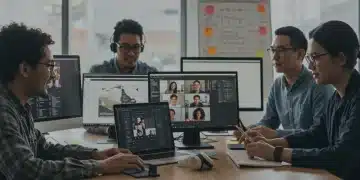U.S. vetoes Gaza ceasefire UN resolution: what it means

The U.S. vetoes on Gaza ceasefire UN resolutions significantly hinder humanitarian efforts and impact global diplomacy, affecting alliances and the credibility of the U.S. as a mediator in peace negotiations.
U.S. vetoes Gaza ceasefire UN resolution have sparked intense discussions about the ongoing conflict. What does this mean for the future of peace talks? Let’s dive in.
Understanding the Gaza conflict backdrop
Understanding the background of the Gaza conflict is vital for grasping the complexities of the ongoing situation. The Gaza Strip is an area with deep historical roots and a rich, yet turbulent, history. Over the years, various factors have contributed to the current state of affairs.
Key Historical Events
Several significant events have shaped the Gaza conflict. For instance, the establishment of Israel in 1948 led to immediate tensions in the region. Many Palestinians were displaced, giving rise to long-lasting grievances. Furthermore, conflicts like the Six-Day War intensified the struggle for territory, bringing Gaza into the forefront of disputes.
Current Dynamics
Today, the situation in Gaza is influenced by political, social, and economic issues. The ongoing blockade has created severe humanitarian crises. Many residents face challenges in accessing basic necessities, such as food, water, and healthcare. The presence of various factions adds layers of complexity, often leading to escalated violence.
- Political fragmentation among Palestinian groups.
- Involvement of external powers complicating peace efforts.
- Economic hardships worsening living conditions.
Ultimately, these dynamics mean that peace efforts remain fraught with challenges. Understanding the historical events and current realities can offer insights into why the U.S. vetoes Gaza ceasefire UN resolution has significant implications on international relations.
The role of the U.S. in international resolutions

The role of the U.S. in international resolutions is critical in shaping global policy. As a permanent member of the United Nations Security Council, the U.S. holds significant influence over various resolutions, particularly regarding conflicts like the one in Gaza. Understanding this role requires looking at both past actions and current implications.
Historical Context
Historically, the U.S. has vetoed numerous resolutions that sought to address conflicts in the Middle East. This includes significant resolutions aimed at establishing peace in Gaza. The decision to veto often stems from political alliances and national interests, reflecting the complex web of diplomacy.
Current Implications
In recent times, the U.S. has been viewed as a key player in international diplomacy. Its veto of the Gaza ceasefire UN resolution raises questions about its commitment to peace efforts. Critics argue that such actions hinder the path toward harmonious resolutions and continue cycles of conflict.
- Impact on humanitarian access and aid in the region.
- Effects on U.S. relations with other countries.
- Potential repercussions for future peace talks.
The U.S. influence extends beyond mere voting. It plays a role in negotiations, funding, and shaping public opinion on global issues. By understanding the U.S. role in international resolutions, we can better grasp the complexities behind decisions made at the UN and their far-reaching effects on conflicts like Gaza.
Impacts of the veto on humanitarian efforts
The impacts of the veto on humanitarian efforts in Gaza are profound and far-reaching. When the U.S. vetoes resolutions aimed at establishing ceasefires or facilitating aid, the consequences can worsen the already dire situation for civilians. Many people in Gaza rely heavily on international aid for basic needs.
Access to Humanitarian Aid
Initially, vetoing a resolution can limit access to essential services. Aid organizations often struggle to deliver supplies like food, water, and medical assistance. The result is a devastating impact on the population, which is already facing immense challenges.
Increased Casualties
Moreover, a lack of ceasefire can lead to prolonged violence and conflict. This escalation frequently results in increased casualties among both combatants and civilians. Families are torn apart, and communities suffer from loss and trauma.
- Disruption of healthcare services and facilities.
- Escalation of violence leading to more deaths.
- Challenges in rebuilding infrastructure.
The cycle of suffering becomes difficult to break. Communities in Gaza often find themselves trapped in a state of emergency, struggling to cope with the ongoing violence. Each veto can close doors to diplomatic negotiations, ultimately prolonging the humanitarian crisis.
Furthermore, international outcry often follows such vetoes, but the tangible effects on the ground remain a pressing concern. Aid workers face immense difficulties as they navigate the political landscape to provide necessary support. Understanding these impacts is crucial in recognizing the complexity of the U.S. vetoes Gaza ceasefire UN resolution and its implications for humanitarian efforts.
Future implications for global diplomacy

The future implications for global diplomacy following the U.S. vetoes regarding the Gaza conflict are significant. As the international community watches closely, the actions taken today can shape future diplomatic relations and peace efforts.
Changing Alliances
One major effect of the veto is the potential shift in alliances. Countries may reevaluate their partnerships based on the U.S. stance in the Middle East. Nations that feel sidelined may seek closer ties with other powers, such as Russia or China, that have different approaches to conflict resolution.
Impact on Peace Negotiations
Furthermore, the credibility of the U.S. as a mediator in peace talks could be questioned. If other nations perceive the U.S. as biased, it can hinder cooperation in future negotiations. The ability to act as a neutral facilitator is crucial in resolving longstanding conflicts like the one in Gaza.
- Increased tension between the U.S. and its allies.
- Challenges in achieving consensus in international bodies.
- Possibility of emerging new diplomatic coalitions.
As a result, global diplomacy might lean toward more fragmented approaches. Regional powers may take the lead in negotiating terms, potentially sidelining traditional powers like the U.S. This evolving landscape shows that the ramifications of the veto extend far beyond immediate conflicts, impacting international order and cooperation.
The dynamics of diplomacy will continue to change as the world navigates these complex issues, emphasizing the need for adaptable strategies that reflect the reality of shifting power balances. Understanding these future implications is essential for comprehending the broader context of the U.S. vetoes Gaza ceasefire UN resolution and its potential effects on global peace initiatives.
In conclusion, the U.S. vetoes regarding the Gaza ceasefire UN resolution have significant implications for both humanitarian efforts and global diplomacy. Understanding these nuances is vital in navigating the complex landscape of international relations. The actions taken today can influence future partnerships, peace negotiations, and responses to ongoing conflicts. By recognizing the potential consequences of such vetoes, we can better grasp the interplay between power dynamics and humanitarian needs.
FAQ – Frequently Asked Questions about U.S. Vetoes and Gaza Conflict
What are the effects of U.S. vetoes on humanitarian efforts in Gaza?
U.S. vetoes can significantly limit access to humanitarian aid, worsening the already dire situation for civilians who depend on international assistance.
How do U.S. vetoes impact global diplomacy?
These vetoes can lead to shifting alliances and diminish the U.S.’s credibility as a mediator in future peace negotiations, potentially isolating it on the global stage.
What are the consequences for peace negotiations in the region?
The perception that the U.S. is biased may hinder collaborative efforts needed to achieve sustainable peace, making future negotiations more challenging.
Why is understanding the context of U.S. vetoes important?
Understanding the context helps clarify how international relations and humanitarian needs are intertwined, influencing responses to ongoing conflicts like Gaza.





